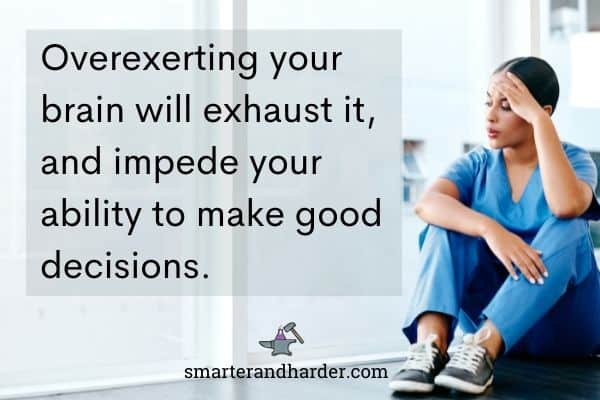You have felt decision fatigue, whether you know it or not. Decision fatigue is something we all deal with from time to time, though we may not always recognize it by that name. It is a normal side effect of day-to-day life that can happen quite easily.
Once decision fatigue kicks in, it gets harder to make even basic choices. That part may be obvious, but decision fatigue can also have a more hidden impact on our temperament.
But the good news is, by taking the time to understand where decision fatigue comes from and how it affects your brain, you can start to put together strategies to make it easier to manage. Sometimes, you can even prevent decision fatigue entirely! Here’s how.
What is Decision Fatigue?
Decision fatigue works just like muscle fatigue.
If you’ve ever carried in a few too many bags of groceries at once or moved some boxes around that were a little heavier than your arms could handle, then you know this feeling. Your arms feel tired, weak, and a bit noodly.

Even something that’s usually pretty easy for those arms, like pouring yourself a nice cold glass of farm-fresh 2% milk, becomes challenging.
In the same way, overexerting your brain will exhaust it and impede your ability to make good decisions.
That’s what decision fatigue is. It’s when your brain is, for whatever reason, a bit fried. Decisions can take up a ton of mental energy. And once that energy runs low, just like a muscle, your brain will need rest before it’s able to function normally again.
Effects of Decision Fatigue on Decision-Making
We can all deduce that decision fatigue means you’ll have a more challenging time making even simple decisions. But there’s a sneakier side to it, too.
Throughout the day, you make choices that you might not even notice you’re making. For instance, walking by a box of pastries and not taking one, or refraining from snapping at your coworker Greg when he asks you the same question for the third time. Those are subtle choices.
Choices like these – subconscious choices – occur when short-term impulses clash with healthy long-term choices. Typically, we are prepared to face these moments and make healthier long-term choices most of the time.
Even if you feel like the pastries usually win, that’s probably not the case. If you walked by them ten times and only indulged in them once, you still made healthy choices 90% of the time. It’s just easier to remember and notice the 10% of the time you succumb to the pastry temptation.
But when you’re dealing with decision fatigue, it suddenly gets a lot harder to make those healthy long-term decisions. The impulses (aka, the pastries) get the upper hand. If you’ve been on this blog before, you may recognize this as dealing with limited mental self-control.
Causes of Decision Fatigue
The more decisions you make throughout the day – from which flavor of popsicle to eat to whether to take that new job – the closer you get to hitting decision fatigue. But honestly, decision fatigue is a bit of a misnomer because there are more causes than simply making too many choices all at once. For just a few examples:
- Needing to be “on” for too long in a social or professional setting
- Cognitively taxing days like big exam days, training for a new job, or any day spent heavily on learning or novelty
- Over-using willpower for behavior changes, like trying to break a bad habit or form a good one
- Decision-heavy activities like shopping and event planning
- Highly emotional experiences like therapy, relationship work, conflicts, etc
These processes engage different parts of the brain, but that doesn’t mean that each works on an independent energy supply. The brain doesn’t work that way. When it gets tired, it’s tired. Whatever the cause. And again, like a muscle, when it wears out, it will need rest before it can bounce back.
In this sense, we can almost think of decision fatigue as being too tired for decisions rather than just being tired from them.
How to Combat Decision Fatigue
Fortunately, the decision fatigue problem is a manageable one. There are various ways you can attack this problem to lighten the load on your mind and set yourself up for more reliable decision-making that makes you feel good about yourself.
Reduce the Decisions
Let’s start with the obvious step, shall we? Even though decisions themselves are not the only cause of decision fatigue, they’re a substantial contributing factor. Researchers have estimated that we each make hundreds, potentially even thousands of decisions each day.
Any opportunity to streamline your day, establish a routine, and reduce the need for decisions will go a long way to preserving your mental energy and reducing decision fatigue. For example:
- Building better habits for the things you want to do every day
- Doing meal prep days or other types of meal planning
- Using calendars/reminders to plan specific tasks/activities ahead of time
Strategies like these free up your mental energy for decisions that are harder to see coming.
Instead of death by a thousand cuts, it’s, well, life, by fewer cuts.
CEOs (people whose whole job is mostly making decisions) know this problem well. And some take this solution to the extreme by, for instance, wearing the same outfit every day. Of course, you don’t need to go that far if you don’t want to, but asking yourself where you can reduce the need for choices will be a huge help.
Be Prepared
Often, though, of course not always, you can see the decision-fatigued days coming. For example, you know when exam week is, what day you’re babysitting all 12 neighbor kids, and when the four-hour quarterly planning meeting happens. This knowledge allows you to prepare.
To the extent possible, try to sandwich events like these in-between periods of relatively low decision-making by:
- Knowing what you plan to eat ahead of time
- Picking out your outfit the night before
- Allowing yourself some time to veg out on the couch after
You won’t always know when a mentally exhausting day is coming. But there is a lot you can do to make for gentle takeoffs and soft landings when you do.
Mind Your Fuel Gauge
This phrase that I keep using – “mental energy” – is not strictly metaphorical. We’re talking about literal physiological energy.
You eat food, and your body breaks some of that food down into glucose, which your brain uses for energy (aka brain juice). This energy powers your thoughts, feelings, and, yes, decisions.
The brain is the most glucose-hungry organ in the whole body, so it makes sense that using a ton of brain juice will consume a lot of your body’s fuel supply.
So another way you can prepare for mentally taxing days is to think ahead and make sure you give yourself a reliable supply of fuel, like complex carbs and healthy fats. Athletes prepare for their extensive training and competition days by ensuring they get plenty of good clean energy and sufficient rest, and we can do the same.

